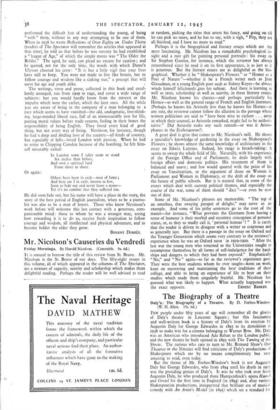Mr. Nicolson's Causeries du Vendredi
Friday Mornings. By Harold Nicolson. (Constable. 8s. 6d.)
IT is natural to borrow the title of this review from St. Beuve. Mr. Nicols9n is the St. Beuve of our days. The fifty-eight essays in this volume, all of which appeared in the columns of The Spectator, are a mixture of sagacity, suavity and scholarship which makes them delightful reading. Perhaps the reader will be well advised to read
at random, picking the titles that arrest his fancy, and going on till he can pick no more, and he has to say, with a sigh, " Pity, they are all finished, and I have no more to read."
Perhaps it is the biographical and literary essays which are the most fascinating. Mr. Nicolson has a remarkable psychological in- sight and a rare gift for painting personal portraits: his essay on Sir Stephen Gaselee, for instance, which the reviewer has always remembered since he read it on its first appearance, is as just as it is generous. But the literary essays are as delightful as the bio- graphical. Whether it be " Shakespeare's Flowers " or "Homer as a Poet of Nature "—whether it be a French writer such as Jean Giraudoux, or a young English poet such as Sidney Keyes—he always winds himself felicitously ,into his subject. And there is learning as well as taste, scholarship as well as suavity; in these literary essays. Mr. Nicolson knows his classics—and perhaps particularly his Horace—as well as the general range of French and English literature. (Perhaps he knows his Aristotle less than he knows his Horace—at any rate, the reviewer cannot follow the allusion in the passage where women politicians are said to " have been wise to eschew . . . areas in which their counsel, as Aristotle remarked, might fail to be authori- tative." Did Aristotle make any such remark—or was it Aristo- phanes in the Ecdlesiazusae?)
A great deal is grist that comes to Mr. Nicolson's mill. He shows a specialist's knowledge of gardening 'in the essay on Shakespeare's Flowers ; he shows almost the same knowledge of architecture in the essay on Edwin Lutyens. Indeed, his range is breath-taking : it seems to sweep the whole field of life. Naturally, with his experience of the Foreign Office and of Parliament, he deals largely with foreign affairs and domestic politics. His treatment of them is balanced and suave ; and few would quarrel with the poise of his essay on Vansittartism, or the argument of those on Women in Parliament and Women in Diplomacy, or the drift of the essay on the future of public schools. But it is natural that, in some of the essays which deal with current political themes, and especially the course of the war, some of them should " aate "—or even be now out of date.
Some of Mr. Nicolson's phrases are memorable. " The top of an omnibus, that swaying parapet of delight," may serve as an example. And some of his pithy sentences go to the root of the matter—for instance, " What prevents the Germans from having a sense of humour is their morbid and eccentric conception of personal status, or, as they so madly call it, ' personal honour '! " It is rarely that the reader is driven to disagree with a writer so courteous and so generally just. But there is a passage in the essay on Oxford and the Younger Generation which seems very contrary to the reviewer's experience when he was an Oxford tutor in 1919-192o. " After the last war the young men who returned to the Universities sought to recompense themselves by all forms of self-indulgence for the hard- ships and dangers to which they had been exposed." Emphatically "No," and "No" again—so far as the reviewer's experience goes. They were the best students whom he ever taught—keen on work, keen on recovering and maintaining the best' traditions of their college, and able to bring an experience of life to bear on their studies which made them singularly fruitful. Mr. Nicolson has guessed what was likely to happen. What actually happened was






















 Previous page
Previous page